Posted August 13, 2025 by Nicky in Reviews / 0 Comments
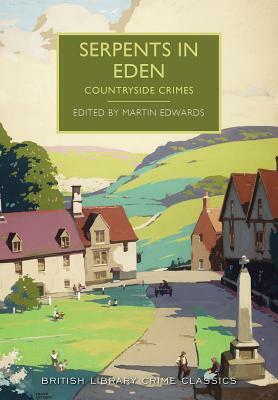
Serpents in Eden: Countryside Crimes
Genres: Crime,
Mystery,
Short Stories Pages: 276
Series: British Library Crime Classics Rating: 
Synopsis: 'The lowest and vilest alleys in London do not present a more dreadful record of sin than does the smiling and beautiful countryside.... Think of the deeds of hellish cruelty, the hidden wickedness which may go on, year in, year out, in such places, and none the wiser.' - Sherlock Holmes
Many of the greatest British crime writers have explored the possibilities of crime in the countryside in lively and ingenious short stories. Serpents in Eden celebrates the rural British mystery by bringing together an eclectic mix of crime stories written over half a century. From a tale of poison-pen letters tearing apart a village community to a macabre mystery by Arthur Conan Doyle, the stories collected here reveal the dark truths hidden in an assortment of rural paradises. Among the writers included here are such major figures as G. K. Chesterton and Margery Allingham, along with a host of lesser-known discoveries whose best stories are among the unsung riches of the golden age of British crime fiction between the two world wars.
As ever, the British Library Crime Classics series editor, Martin Edwards, put together a spread of stories by different authors and from slightly different periods for Serpents in Eden, themed around mysteries set in the countryside. Some of them are better than others, but overall I thought it was a pretty strong collection.
A highlight for me was the R. Austin Freeman story; he’s always so thorough, and while in this one I had an idea what Thorndyke was looking for, it was interesting to see the process unfold. At least as far as the detecting part goes — the spy stuff was a little less interesting to me, but that just provides the motive, and not much of the actual mystery part.
For some reason this one did take me longer to finish than I’d have guessed, so I guess it was a bit slow/the majority of the stories were quite long, but it’s not like I minded that.
Rating: 4/5 (“really liked it”)
Tags: book reviews, books, British Library Crime Classics, crime, Martin Edwards, mystery, short stories
Posted June 30, 2025 by Nicky in Reviews / 0 Comments
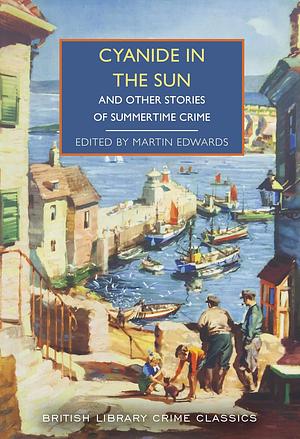
Cyanide in the Sun and Other Stories of Summertime Crime
Genres: Crime,
Mystery,
Short Stories Pages: 288
Series: British Library Crime Classics Rating: 
Synopsis: “All about them, happy holiday-makers were strolling and laughing, evidently oblivious of the prevailing perils of their chosen resort...”
A cold case of poisonings heats up at a quaint guest house. A string of suspicious murders follows a crime writer’s tour bus. Two seedy stowaways uncover an infamous smuggling ring. Everyone needs a break now and then, but sometimes getting away can be murder.
In this new anthology, Martin Edwards presents a jam-packed travel-case of eighteen classic mysteries, featuring short stories from crime fiction legends such as Christianna Brand, Anthony Berkeley and Celia Fremlin alongside rare finds revived from the British Library archives. Including intriguing notes on the stories and their authors, this volume is your ticket to a thrilling journey from 1920s seaside skulduggery through to calamity in 1980s suburbia – perfect for armchair travelling or your own summer getaway.
Cyanide in the Sun and Other Stories of Summertime Crime is, as usual, edited by Martin Edwards and collects a range of “classic” crime stories (where “classic” means mostly within a certain period of crime fiction, rather than “well known and has stood the test of time”, etc), this time themed around holidays.
There’s a surprising number of short ones in this volume, which makes it speed by quite a bit, and I feel like there was less reliance on the same few obvious names (though of course Christianna Brand, Anthony Berkeley and Julian Symons do appear), maybe. Perhaps the net is being cast a bit wider now, with so many collections already out there.
As usual, there were one or two I didn’t care for, but it’s an interesting collection as a whole.
Rating: 3/5
Tags: book reviews, books, British Library Crime Classics, crime, Martin Edwards, mystery, short stories
Posted June 6, 2025 by Nicky in Reviews / 0 Comments

Cat and Mouse
Genres: Crime,
Mystery Pages: 255
Series: British Library Crime Classics Rating: 
Synopsis: Girls Together magazine agony-aunt 'Mrs Friendly-wise', aka Katinka Jones, finds herself at a loose end in Swansea, and decides to pay a surprise visit to one of the magazine's regular correspondents, 'Amista'. But reaching the address a strange house perched atop a mountain which matches all of the descriptions in the letters nobody has even heard of 'Amista'. As Katinka begins to fall for the dashing master of the house, Carleon, more weird mysteries emerge and the plucky Detective Inspector Chucky joins the search for the truth in this self-consciously lurid mystery-melodrama; a rollicking cavalcade of Brand's signature twists and turns.
The first of Brand’s non-Cockrill stories to join the Crime Classics, and the sixth Brand novel in total, a series bestseller. A playful and experimental novel in which Brand sets out to combine Gothic melodrama with her signature style of mystery complete with astonishing twists and bombshell clues hiding in plain sight.
I’m not a great lover of Christianna Brand’s work, generally, and I’ve liked her books less as I’ve read more of them, somehow. So perhaps it’s not too surprising that I actively loathed the latest reissue of her work by the British Library Crime Classics series, Cat and Mouse.
As far as I can tell, it’s less intended as one of her straight-out mystery novels, and more written as a parody of dramatic gothic mysteries; it reminds me a little of Ethel Lina White’s work. And it’s excruciatingly awful to read. The main character is humiliated at every turn, and makes multiple wild accusations while acting — sorry, but this is the best word I can come up with — hysterically, there’s a romance that makes absolutely no sense… arrghhh, it just drove me nuts. I hated it.
The one good thing I can say for it is that it did genuinely feel like it was set in Wales, and evoked that perfectly.
Rating: 1/5
Tags: book reviews, books, British Library Crime Classics, Christianna Brand, crime, mystery
Posted May 20, 2025 by Nicky in Reviews / 2 Comments
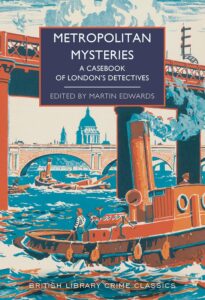
Metropolitan Mysteries: A Casebook of London's Detectives
Genres: Crime,
Mystery,
Short Stories Pages: 316
Series: British Library Crime Classics Rating: 
Synopsis: Lord Peter Wimsey reads murder in the minutiae of a Bloomsbury kitchen. Dr. Gideon Fell unravels a locked-room mystery from a flat in Chelsea. Superintendent Aldgate cracks the case of the body atop Nelson’s Column.
The streets of London have been home to many great detectives since the days of Sherlock Holmes and Watson, with some of the best authors in the genre taking to the short story form to pit their sleuths against crimes ranging from murders on the Tube to heists from the capital’s finest jewellers.
Featuring a roster of Scotland Yard’s meticulous best, a cohort of daring doctors and a cadre of characterful private investigators, this new selection by Martin Edwards includes eighteen vintage mystery stories from a period between 1908 and 1963 to showcase the city’s most compelling classic cases.
With contributions by Margery Allingham, John Dickson Carr and Dorothy L. Sayers along with rare finds by Raymond Postgate, J. Jefferson Farjeon and many more, this anthology invites you to join some of the greatest detectives ever written on their perilous trail through London’s darker underside.
Metropolitan Mysteries is another anthology edited by Martin Edwards for the British Library Crime Classics series, this time themed around London’s fictional detectives. Some of the famous ones are here, of course — Wimsey, Holmes — but some more obscure ones as well. As usual with this series’ anthologies, it’s an interesting survey of the “classic” crime fiction (though I think “classic” is a bit tired and ill-defined when it comes to this series: Golden/Silver Age would be a better descriptor, perhaps).
Also as usual with these anthologies, I think it’s greater than the sum of its parts. I’d read some of the stories before, but some of the others are of surprising interest, and altogether it’s a bit like a series of taster dishes for different authors and slightly different phases of crime fiction.
There are some stories that are better than others (I thought the Allingham one was pretty weakly related, just included just to shoehorn Campion into it, just barely), but as a whole it’s fun.
Rating: 3/5
Tags: book reviews, books, British Library Crime Classics, crime, mystery, short stories
Posted May 16, 2025 by Nicky in Reviews / 0 Comments
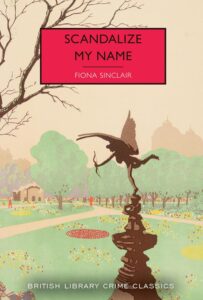
Scandalize My Name
Genres: Crime,
Mystery Pages: 240
Series: British Library Crime Classics Rating: 
Synopsis: One the eve of Elaine Southey's 21st birthday, Ivan Sweet has been found dead in his flat in the basement of the Southeys' historic north London home. A slick charmer to some of the tenants and a loathsome young scoundrel to others his death doesn't draw out many tears among the house's residents and neighbours. And yet the sordid truth starts to seep into the heart of their small community a murder is living among them, and who's to say when they might strike again? The shrewd Oxford man Superintendent Paul Grainger finds himself faced with a small circle of suspects whose connections and hidden motives heap complexity upon complexity in this tightly wrought mystery, shot through with a chilling touch of the macabre.
Fiona Sinclair’s Scandalize My Name feels very much on the cusp between “Golden Age” styles of mystery fiction and the more modern gritty crime. There’s a detailed and explicit autopsy scene, which is definitely not something I expected from something in this series, but there’s still a sense of an individual police officer going about the normal beat. Grainger’s not a world away from Lorac’s Macdonald at all, they’re very much in the same mode, even if the story has a lot more gruesome detail.
Overall, I think this one didn’t give enough clues to tie the solution of the mystery in with the rest. There was a rather sudden and very dramatic denouement which revealed the killer, but it didn’t really feel like the plot had got there yet — the denouement revealed the killer, rather than the detective.
There were some interesting character portraits, but I think it mostly felt a bit thin — maybe, as the introduction by Martin Edwards says, because there’s too many characters introduced and used as POV characters, and too much swapping around between them. That said, that doesn’t feel too unusual for a mystery story.
Rating: 3/5
Tags: book reviews, books, British Library Crime Classics, crime, Fiona Sinclair, mystery
Posted May 10, 2025 by Nicky in Reviews / 0 Comments
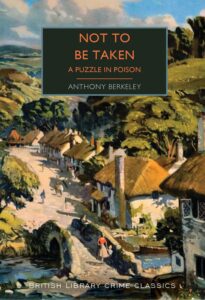
Not To Be Taken
Genres: Crime,
Mystery Pages: 256
Series: British Library Crime Classics Rating: 
Synopsis: A classic case of the apparent suicide that proves to be murder. John Waterhouse's death certificate gives cause of death as gastric ulcers, but when his brother insists on the body being exhumed so that a post mortem can be carried out, it proves the case that poison has been at work. Will Douglas Sewell, who watched his good friend die, be able to use his knowledge of those concerned to unravel the clues and uncover the murderer?
Anthony Berkeley’s books can be a bit hit or miss for me, apparently: there’s one I quickly gave up on for bizarre misogynistic shenanigans, and others that I really liked. Not to be Taken is one of the latter: it’s a slow-moving, contemplative one, a fair-play mystery very deliberately set up for the audience to guess, because it was originally a competition!
The female characters are mostly handled with respect, except the hypochondriac Angela, but I think that’s mostly because she’s a hypochondriac, and it’s basically about two microns away from being “hysteria”. (Or you could view her as deliberately manipulative, and not really a hypochondriac — which is a mental illness which deserves sympathy and treatment — but I’m not sure she’s meant to be doing it deliberately.)
The main character, the accidental detective, isn’t an amazing detective, but nor is he a completely dim “Watson” type, which I found interesting as well. For Berkeley’s purposes in writing a solveable mystery, he has to have enough intelligence to be observant, and it’s clear he’s rather underestimated by the culprit — while not really being on their intellectual level, perhaps.
The edition from British Library Crime Classic includes the final chapter (presumably not originally published with it, since it contains the solution) and a report by Anthony Berkeley on the submissions for the contest. It’s interesting to me that nobody understood the full solution (and I wouldn’t have either), considering that people so often complain about mysteries being totally predictable.
It was a playful time for mystery fiction, and that’s always really fascinating to read.
Rating: 4/5
Tags: Anthony Berkeley, book reviews, books, crime, mystery
Posted April 5, 2025 by Nicky in Reviews / 0 Comments
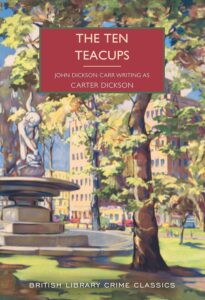
The Ten Teacups
Genres: Crime,
Mystery Pages: 256
Series: British Library Crime Classics Rating: 
Synopsis: "There will be ten teacups at number 4, Berwick Terrace, W. 8, on Wednesday, July 31, at 5 p.m. precisely. The presence of the Metropolitan Police is respectfully requested."
Writing as Carter Dickson, the master of the locked room mystery John Dickson Carr returns to the Crime Classics series, pitching his series amateur detective Henry Merrivale against a seemingly watertight mystery: after the police are sent a note warning them about a forthcoming crime, a man is shot in a room on the top floor of a Kensington townhouse – a house watched from all sides during the murder. Surely nobody could have gotten in or out? And yet the man is dead, and just like the last time the police received a note like this, there are ten teacups set out at the scene of the crime. H.M. is drawn to unravel this bizarre crime, as the mysterious significance of the ten teacups in murders past and present pushes the police to their limits.
Carter Dickson (AKA John Dickson Carr) was one of the masters of “impossible mysteries”, and to some extent your enjoyment of his work will depend on much you enjoy that genre. I’m not a huge fan, and I previously found Carr’s work frustrating, so even though I’ve come round to some appreciation of it, I found The Ten Teacups a bit frustrating.
The thing that gets me is that they’re always so contrived, with such tight constraints for them to function properly. And this book posits not just one impossible crime, but two. I won’t go too much into the details, but it really requires so much fine-tuning of murder that it always feels artificial to me. I did like the practice of footnoting back the pages where you can find the clues, though — or at least, I found it interesting as a convention.
There is one really macabre moment when you realise that someone has made a corpse into a chair to hide it, and is sitting on the corpse. Just. Yipes. There’s some genuine atmosphere in that portion of the story.
On another note, I found the portrayal of the Welsh character a little discomforting. Perhaps the aspect of him being wild/savage/atavistic wasn’t meant to be correlated with his Welshness, but I suspect it was, and that’s… just weird and unpleasant in a book from 1937. You’d have thought the Welsh would be seen as properly human by then, surely.
Not a favourite of Carr’s work for me, for sure, though your mileage is likely to vary: apparently this is regularly voted one of the best impossible mysteries of all time!
Rating: 2/5
Tags: book reviews, books, Carter Dickson, crime, John Dickson Carr, mystery
Posted February 24, 2025 by Nicky in Reviews / 2 Comments
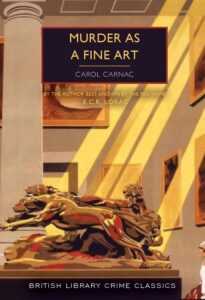
Murder as a Fine Art
Genres: Crime,
Mystery Pages: 236
Series: British Library Crime Classics Rating: 
Synopsis: When a civil servant at the newly formed Ministry of Fine Arts is found crushed beneath a monstrous marble bust after dark, it appears to be the third instance in a string of fatal accidents at the department. Already disturbed by rumours of forgeries and irregularities in the Ministry’s dealings, Minister Humphry David is soon faced with the possibility that among his colleagues is a murderer – though how the bust could have been made an instrument of death is a masterstroke of criminal devilment. Taking charge of the case, Inspector Julian Rivers of Scotland Yard enters a caustic world of fine art and civil service grievances to unveil a killer hiding in plain sight.
Murder as a Fine Art is one of E.C.R. Lorac’s books under the “Carol Carnac” pen-name, and features Rivers and Lancing rather than Macdonald. I do prefer the books which feature Macdonald, because he seems a bit more human and sympathetic than Rivers or Lancing: my sense is that the puzzle of it is more important than the human element in the books featuring them.
Which is not to say that Lorac’s usual attention to character and place is absent: the story is set within a building called Medici House, in a post-war government Ministry, and the Minister himself is a sympathetic character, one you find yourself hoping isn’t entangled in the crime. There’s definitely still a good eye to what people are like: for example, the two detectives agree that the deceased was probably not hated by his subordinates, as there’s a sort of affectionate nickname for him suggesting toleration of his foibles. And Medici House is very carefully evoked, its splendours and inconveniences all at once.
But overall there’s a lot of time spent on the howdunit, on procedure, and my impression is that there’d be a bit less of that with Macdonald — or perhaps it’d feel more hands on? Personal? I’m not sure exactly; maybe it’s just that I don’t feel I “know” Rivers and Lancing and what they’ll do or care about.
Anyway, it’s still an enjoyable puzzle. Not a favourite, but absorbing and worthwhile.
Rating: 4/5
Tags: book reviews, books, Carol Carnac, crime, E.C.R. Lorac, mystery
Posted February 17, 2025 by Nicky in Reviews / 0 Comments
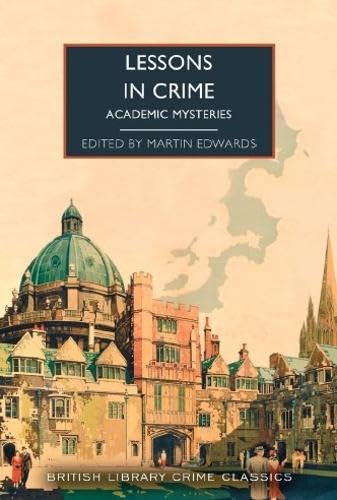
Lessons in Crime: Academic Mysteries
Genres: Crime,
Mystery,
Short Stories Pages: 336
Series: British Library Crime Classics Rating: 
Synopsis: An Oxford Master slain on campus during Pentecost. A pupil and teacher face off with a conniving uncle suspected of murder. A sociology student turns the tables on the lies and fictions of an English undergraduate.
In the hush of the college library and the cacophonies of school halls, tensions run higher than is healthy and academic achievement can be to die for. Delving into the stacks and tomes of the British Library collections, Martin Edwards invites you to a course on the darker side of scholarly ambition with an essential reading list of masterful short stories.
With a teaching cohort including esteemed writers such as Dorothy L Sayers, Celia Fremlin, Michael Innes and the commanding Arthur Conan Doyle, this new anthology offers an education in the beguiling art of mystery writing.
Lessons in Crime is a pretty recent collection from the British Library Crime Classics series, edited as usual by Martin Edwards. Unsurprisingly, this one focuses on mystery stories set in academic settings — schools, weekend courses, and of course, universities.
There are some big names here — Sayers, Arthur Conan Doyle — and some lesser-known ones, along with ones that are familiar to me from these anthologies, such as E.W. Hornung. As ever, the whole is greater than the sum of the parts: I’m not a huge fan of Reggie Fortune and A.J. Raffles as characters, but in a collection like this, it all adds up to a feel for how writers viewed and used these settings, the trends in the stories, etc.
I was a little surprised by the heavy anti-Welsh sentiment in one of the stories: it’s been a while since I met that kind of thing so openly. (The Welsh character mutates ps and bs in English, lies habitually, etc, etc; we’re in “Taffy was a Welshman” territory.) I know the British Library Crime Classics series typically doesn’t edit this sort of thing out, and they do say so in a preface — they present the stories as part of their historical context, as well as for entertainment. But it was a little surprising, all the same.
A nicer surprise was a story by Jacqueline Wilson — yes, that one! Her earliest works were crime stories, and one of her short stories is included here to round out the volume with a recent story.
Overall, a collection I enjoyed!
Rating: 4/5
Tags: book reviews, books, British Library Crime Classics, crime, Martin Edwards, mystery, short stories
Posted February 11, 2025 by Nicky in Reviews / 2 Comments
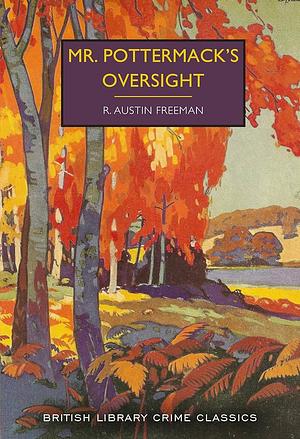
Mr. Pottermack's Oversight
Genres: Crime,
Mystery Pages: 302
Series: British Library Crime Classics Rating: 
Synopsis: On a sultry afternoon in July, a man stumbles through thick foliage and rough ground, making for the coast. He wears prisoner’s garb and the guards are hot on his heels. Happening upon a bather’s clothes – the bather nowhere in sight – the escapee takes the risk, changes and leaves the scene looking the part of the average beachcomber.
But it can be hard to stay hidden forever. When a blackmailer intrudes for the last time upon the promising life of the man who now calls himself Mr. Pottermack, a violent fate befalls him, and the stakes are set: Pottermack must avoid discovery at all costs to escape the hangman’s noose for murder.
When Pottermack’s attempts to fabricate evidence arouse the suspicions of the fiercely forensic Dr. Thorndyke, a nerve-racking game is afoot as we follow both detective and suspect in their contest to root out – or bury – the damning truth in this inverted-mystery classic, first published in 1930.
I was looking forward to Mr Pottermack’s Oversight, because I’d read one of R. Austin Freeman’s earlier books and really liked it. It was slow and methodical, but in a way that was interesting. This one had the same style, but it was maybe a bit too slow and methodical, and Freeman’s interest in writing a sort of inverted mystery (the mystery is more how the detective works out what happened, since we see the crime committed directly, and spend most of the book with the killer) went maybe a bit toooo in depth. There’s a certain amount of detail that lends verisimilitude, and then there’s getting overly into detail about (for example) casting a copy of a shoe sole from a footprint…
That said, somewhere partway through I entered into the spirit of the thing a bit more and found myself reading as eagerly as I’d expected. I don’t know whether the pace just improved a bit there (probable) or maybe I just got used to the new expectations. For a killer, Pottermack is pretty likeable, though the sense that he’s justified is set up very very deliberately and transparently (the victim is a blackmailer who originally framed him for the crime he’s blackmailing him about).
I really wonder whether the lady in the case has realised that of course it is her lost love… but we’re never told that explicitly.
Overall, I genuinely enjoyed it, but it felt like a bit of a book of two halves — though I couldn’t put my finger on a specific dividing point. Hard to rate, as a consequence, but ultimately I’ll go with my final assessment: a fascinating “inverted mystery”, if a little slow at times.
Rating: 4/5
Tags: book reviews, books, British Library Crime Classics, crime, mystery, R. Austin Freeman














